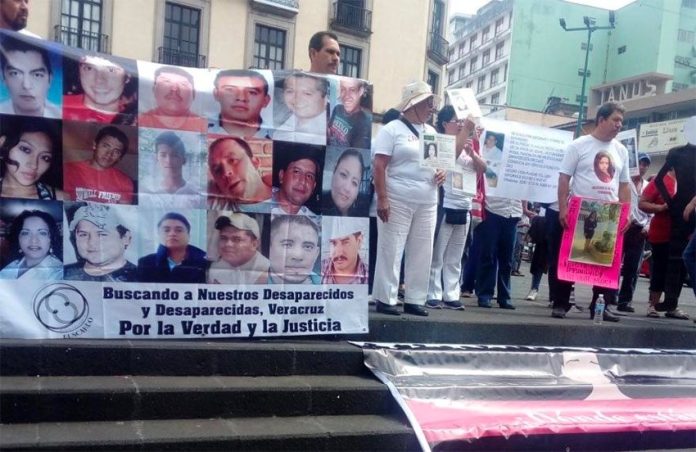More than 300 bodies have been exhumed from hidden graves in Veracruz over the past two years, according to members of a group dedicated to searching for missing persons in the state.
In August 2016, the collective Solecito, which is made up of families of kidnapping victims, began the grisly task of identifying sites on a 10-hectare piece of land near the city of Veracruz where bodies have been buried in makeshift graves.
Once the graves are found, officers from the Federal Police’s scientific division excavate the areas.
With the discovery of six skulls last week, the remains of 295 people have now been recovered from the Colinas de Santa Fe property.
By the middle of next month, search efforts at the state’s largest clandestine grave are expected to end and construction of a memorial for the victims will begin.
In the municipality of Omealca, Federal Police have recovered at least another 20 bodies and 12 skulls from four artesian wells.
Marcela Zurita, the leader of Solecito in Córdoba, said the search in Omealca started last month and will continue until all the detected graves have been fully excavated.
Two bodies exhumed in the municipality, which is located about 25 kilometers southeast of Córdoba, have been identified by their clothing and the personal documents found on their person but are still awaiting DNA testing for formal confirmation.
Following a meeting Saturday with the four candidates for state governor, Solecito member Lucía Díaz said that the state is living through “a humanitarian crisis.”
In February, the Veracruz government formally accused four high-ranking former security officials and 15 police officers of the forced disappearance of 15 people during the administration of former governor Javier Duarte.
The Institutional Revolutionary Party (PRI) ex-governor is awaiting trial on corruption charges and a Veracruz judge issued new charges against him last week, accusing him of being involved in the forced disappearance of at least 13 people.
Despite the arrests, Díaz charged that investigations into disappearances in the state are not thorough and that in some cases officials have refused to file the complaints lodged by victims’ family members.
She also accused the current state government of politicizing the investigations and warned that the haste to leverage a political advantage — the son of current Governor Miguel Ángel Yunes Linares is contending the July 1 election to replace his father — could result in errors which jeopardize the serving of justice.
“They’re playing with very dangerous issues because if they make mistakes in their electoral zeal and later they can’t properly try [the accused], they will have to pay in some way,” Díaz said.
She called on whoever becomes the next governor to head a government which treats victims and their families with dignity and conducts a thorough search for the disappeared persons.
The Solecito collective rebuked Veracruz Attorney General Jorge Winckler this month when he appeared in a soccer team photo with other officials from the FGE, the office he heads. The name of their team is Los Desaparecidos, or The Disappeared.
“It’s a mockery that humiliates [victims and their families] . . .” Díaz said.
Source: Milenio (sp), Animal Político (sp)
